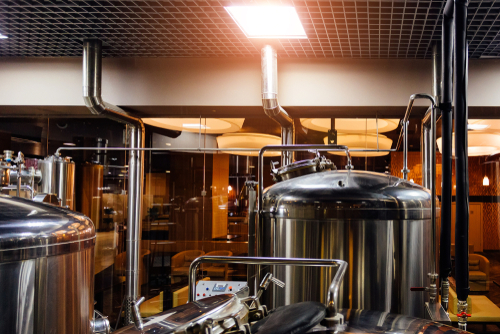We are all no doubt familiar with the term ‘craft beer’. Craft beer manufacturing is taking an increasing share of the broader beer market, with a new brewery opening in Australia, on average, every six days according to the Independent Brewers Association (1). Furthermore, the quality and breadth of flavours that craft beer offers has made craft beer a rival to wine in complimenting food. Independently owner craft breweries, or microbreweries, are generally characterised by their small output and strong emphasis on quality, flavor, and brewing technique. It is this quality focus that makes microbrewery equipment an essential ingredient to a microbreweries success.
What microbrewery equipment is required?
A microbrewery can be broken down into a number of systems which must all be designed, installed and maintained to the highest standards in order to deliver a quality finished product.
Mash System
Mashing is the process of combining your milled malt with water and then heating the mixture. The mashing system includes a mash tank, an electric steam generator and a water temperature controller with flow meters, to allow for accurate and repeatable mashing.
Lautering system
The lautering system, which separates the wort from the grain, is another essential component among your microbrewery equipment. It often encompasses a gear-motor-propelled rake, multiple spray jets, heating and recirculation pump systems.
Brewery System
This is where, you guessed it, the wort, hops and flavours are brewed together. Also known as the Brew Kettle, this system brings the brew to a consistent boil and uses a whirlpool to separate unwanted solids.
Fermentation system
The finished brew gets transferred to a fermenter. The fermentation system includes a fermentation tank, yeast adding equipment and a cooling pump as well as temperature controls. This is the most delicate process as far as hygiene is concerned.
Cooling system
As the brew makes it’s way through various steps in the process, temperature plays a key role in product quality and consistency. The cooling system includes cooling tanks and refrigeration units, both of which need to provide high efficiency cooling.
Filter system
Filtering systems can range from simple one’s which just remove the solid components, to the finest filtering systems which eliminate all the microorganisms in the liquid. Filtration systems are essential to the final adjustments to the flavour of the product, and may include filter tanks, drainage systems and pumps.
Controlling system
Controlling systems for the brewery process combine time, temperature and the wide number of input and output functions. Microbrewery controlling systems may include meter controlling boards, PLC controllers and refrigeration boards.
Cleaning system
Just as important as the production systems, the cleaning system ensures both product quality and compliance. Cleaning systems may include sterilization tanks and washing pumps.
Packaging system
if you plan on selling beer outside your microbrewery, packaging options range from kegs, bottles or cans. A good packaging system needs to perform kegging, bottling or canning with high quality standards, speed and precision.
Other microbrewery equipment considerations
When planning a microbrewery, equipment needs to be selected based on what is appropriate for the type and volume of a craft beer being manufactured. The layout of the manufacturing space must also be factored in, including both dimensions as well as water and electricity access points. Other microbrewery equipment considerations include:
- Design: Are your microbrewery equipment selections designed to gain the highest efficiencies for the business and produce the best results to reach budgets for your business. ONJ Services can assist in designing and installing manufacturing systems that meet your unique business requirements.
- Safety: have you had safety checks carried out and are they compliant with Australian standards
- Maintenance: Do you have a regular scheduled machinery maintenance program in place for all of your production machinery components. ONJ Services specialize in creating maintenance schedules that work within your timeframes during times of low production so there is minimal disruption to your business and minimise the risk of sudden breakdowns and disruptions to facility production.
- Future planning: Consider how you would upgrade your equipment if you decided to expand your manufacturing capabilities.
- Emergency planning: In addition to quality design, installation and regular servicing, it is important to have an emergency plan in place. ONJ Services provide 24/7 manufacturing machinery breakdown services. Having an emergency plan in place can dramatically minimize downtime and loss of productivity.
Hygiene, safety, productivity, precision – ONJ Services combine all of these essential elements in their machinery design, installation, maintenance and repair services within the microbrewery and wider food and beverage manufacturing industries.
With over three decades of experience, ONJ Services can help in the design and install of new manufacturing process components, project manage system upgrades or assist with entirely new set ups.
If you’re interested in finding the best machinery design, installation and servicing team for your manufacturing facility, give John a call on 1300 000 ONJ.


